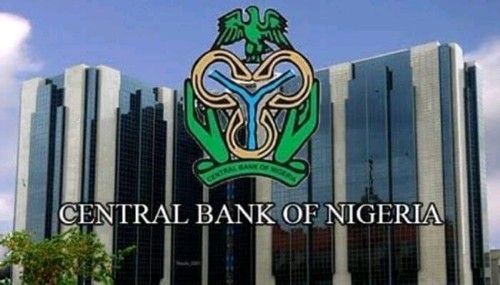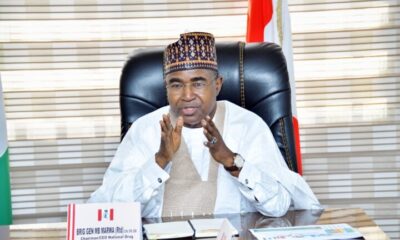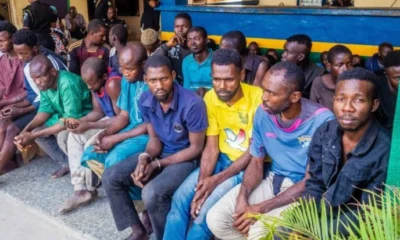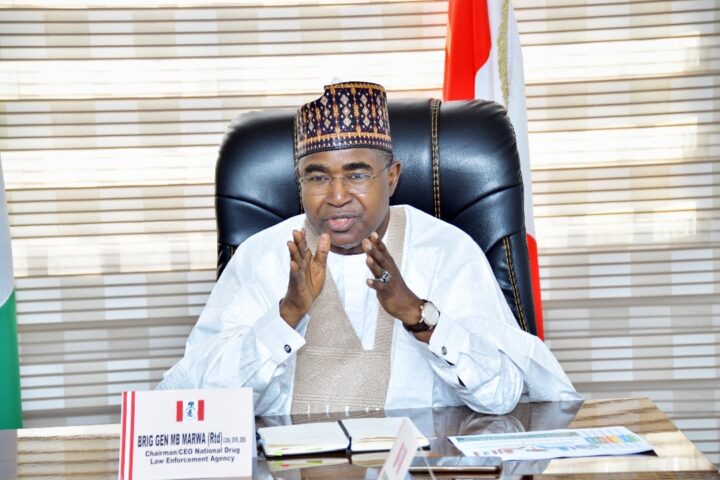Over two weeks after the Central Bank of Nigeria promised to clear over $10bn foreign exchange debts owed to Deposit Money Bank, the apex bank has yet to do so.
This came as the naira was sold between 990/$ and 995/$ by Bureau De Change operators on Friday and Saturday in Lagos, Abuja, and Kano.
On the Investor & Exporter forex window, the naira however appreciated to 747.76/$ on Friday, from 772.98/$ on Thursday.
The immediate past acting CBN Governor, Folashodun Shonubi, on September 6, 2023, said the apex bank had concluded negotiation on dollar debts with commercial banks, disclosing that all forex exchange backlogs would be cleared within one to two weeks.
According to him, deposit money banks have assisted the apex bank in clearing the majority of its overdue FX forward contracts at maturity.
As such, he said the CBN had reached an agreement to reimburse the lenders within one or two weeks following extensive debt restructuring talks that lasted over a long period of time.
“In response to questions about the backlogs, the banks have been working with the CBN on various structures to clear them. So, what happens is that at maturity, they make the foreign exchange available to those who need it.
“We are discussing with them so we can structure their own. So, we are working towards clearing them in the next one or two weeks. It is something we have been discussing for a while,” Shonubi had told an audience at a forum in Lagos
However, multiple top bank executives told The PUNCH on Sunday that almost three weeks after the promise, the apex bank had yet to make good its promise.
They said the development had put banks in a very tight FX liquidity position, a situation that has made many lenders temporarily suspend several FX transactions including school fees and Personal Travel Allowance applications.
Findings show the situation has also worsened dollar liquidity at the parallel market as bank customers shift to the black market to meet their forex needs.
“The FX backlogs have not cleared. The promise has not been made good. We are hoping that the new CBN governor will begin a discussion with banks on it or clear them immediately,” the executive director of a commercial bank anonymously said.
Also, a top official of a Tier-2 bank privy to the development, said, “We have yet to see the FX backlogs cleared including the overdue forward contract obligations. We don’t know when this will be cleared. Unfortunately, the situation has worsened our FX position, making many banks put some FX demands of their customers on hold.”
A report by JPMorgan, a United States-based lender put the total amount of forward contract debt owed by the CBN at $6.84bn. The CBN has however dismissed the report.
Reports had put forward contracts and dollar swap deals between the apex bank and banks at over $10bn.
The CBN could not be reached for immediate comments as of Sunday.
Naira slumps
On Friday, pressure mounted on the naira at the black market with BDC operators in Lagos, Abuja and Kano lamenting dollar scarcity,
An Abuja-based BDC operator, Sanusi Ibrahim, said, “We sold the naira for as high as 1,000/$ on Saturday. On Friday, we were buying and selling for 980/$ and 995/$.”
Another BDC operator, who is based in Ikeja, Yusuf Kareem, said, the naira was sold for 995/$. It is scarce; I cannot sell below that because I also bought it expensive. Only those who have it can sell.”
At the parallel market, the Pound Sterling was bought and sold for £1,235/ and £1,250/, while the Euro was bought and sold for 1,025/€ and 1,028/€, according to operators in the segment of the market.
On the Investor & Exporter forex window, the naira however appreciated to 747.76/$ at the close of Friday, from 772.98/$ on Thursday.
Manufacturers fear closure
Meanwhile, operators in the economy have feared further rise in the cost of goods and services, and more shutdowns of their operations over the worsening naira value.
They called for urgent intervention in the sector to prevent more hardship for Nigerians.
The National Vice Chairman of the Nigerian Association of Small-Scale Industrialists, Segun Kuti-George, said higher prices would be the unavoidable consequence of the current exchange rate.
He expressed dismay that the floating of the naira which was supposed to curb speculation of currency speculation, had consequently escalated the activities of speculators.
According to Kuti-George, unless the government moves swiftly to stem the tide of the naira depreciation especially at the parallel market where more customers access the FX, more factories would be forced to shut down.
He said, “It is ironic that what works in other places doesn’t work in Nigeria. The cost of production is rising, because we still import a large part of our input, especially equipment. Most of the raw materials that we use are imported.
“So, when the cost of input goes up, the cost of production also goes up. This will happen to the price of products. The question now is – will people be able to afford our products now? Will imported products not be cheaper than our own to the extent that people will be rejecting our products for imported ones? Unless the tide is stemmed, there will be more factories closure.”
Inflation
The President of the Manufacturers Association of Nigeria, Francis Meshioye, said the current exchange rate would inevitably lead to a hike in the prices of products given the toll it would take on manufacturers to access foreign exchange.
According to him, the floating of the exchange rate will not mean anything to operators if the naira continues to the free.
Meshioye said, “It is an unpleasant development because that is the major currency through which we purchase our goods outside the bounds of our nation. It means that the cost of raw materials will continue to skyrocket.
“It is unpleasant. We hope that the government will do something about it. While we float the exchange rate, it should not be allowed to be somersaulting and skyrocketing to unreasonable levels which will not augur well for the country, knowing full well that we are not just trading amongst ourselves.”
He added “We have to trade outside of our bounds. The implication of this is that our prices may be unreasonably higher than the prices of other countries. That implies, among other things, that our products may be found to be too expensive. If you want to look at the unavailability of disposable income among the citizenry, the choice of buying Nigerian-made products, which may be expensive, and foreign products which are cheaper is low. It is pathetic.”
Scarcity
The President, of the Association of Bureaux De Change Operators of Nigeria, Dr. Aminu Gwadabe, said the volatility of the local currency had continued to underpin the nation’s slow economic growth.
He said, “The high demand pressure at the 1&E window and the parallel market due to lack of sufficient liquidity have been fuelling the widening gap between the I&E Window and the parallel market rates.
“Combination of several factors including the investors’ backlog estimated at $6.8bn and disincentives to bring fresh funds into the economy is one of the major concerns.
“In the same vein, the dwindling receipt of Diaspora remittances and resurrection of subsidy on petrol are major deterrents and big concerns to fresh liquidity in the market.”
According to him, the uncertainties and loss of public confidence in the local currency have heightened demand pressure in all segments of the market.
He said, “In addressing the challenges of the I&E window, there is a need for the legislation of the willing buyer and willing seller concept. This will lead to enhanced liquidity in the foreign exchange market and enhance public confidence.
“It is also imperative in this regard to recognize the inclusion of the BDCs at the I&E window to continue to play their roles of moderating and correcting the markets.”
He advised the Federal Government on how to bring in more Diaspora remittances.
The CBN had recently announced an operational mechanism for the BDCs to trade foreign currencies at similar rates obtainable on the Investor and exporter forex window.
It gave the directive to all BDCs and the general public in a circular number TED/FEM/PUB/FBC/001/007 dated August 17, 2023, titled, ‘Operational mechanism for Bureau De Change operations in Nigeria’.
The circular stated, “The spread on buying and selling by BDC operators shall be within an allowable limit of -2.5 percent to +2.5 percent of the Nigerian exchange market window weighted average rate of the previous day.
“Mandatory rendition by BDC operators of the statutory periodic reports (daily, weekly, monthly, quarterly and yearly), on the financial institution forex rendition system which has been upgraded to meet operators’ requirements.”
Confidence
The Director/Chief Executive Officer, Centre for The Promotion of Private Enterprise, Dr Muda Yusuf, said the new CBN Governor, Dr. Olayemi Cardoso, was assuming the leadership of the CBN at a very crucial time in the economic history.
He said, “There is a serious confidence crisis in the foreign exchange market fuelling an unprecedented speculative onslaught on the naira. The economy is grappling with severe adverse effects of depreciating exchange rate, soaring energy costs, ravaging inflationary pressures, huge backlog of foreign exchange obligations that needs to be cleared and debt service obligations that need to be redeemed. Sadly, these outcomes are manifesting at a time when the country’s foreign reserves have been substantially encumbered.
“There is an apparent deceleration in the pace of economic reforms as the outcomes are at variance with expectations. The social costs of the reforms were substantially higher than anticipated, resulting in push-backs from the civil society.”
He said the economic management orthodoxy of market forces was being called to question in the light of the social outcomes of the market-oriented reforms.
He said there was a measured re-emergence of political economy with the reappearance of fuel subsidy and divergence in exchange rates.
This was evidently an economic management quandary that the new economic team would have to manage, and urgently too, he said.
Yusuf said, “Meanwhile, the CBN must ensure strategic and transparent intervention in the forex market to minimise volatility, as far as the reserves can support. In addition to the I and E window, it has become necessary to create an autonomous window in the banking system where the currency can trade freely without any encumbrances. This is necessary to avert the diversion of remittances to other jurisdictions or the black market. We cannot afford to live in denial at this time.
“The clearance of the backlog of forex obligations should be accorded high priority to restore the confidence of domestic and foreign investors.”
Credit: The Punch.

 BIG STORY3 days ago
BIG STORY3 days ago
 BIG STORY2 days ago
BIG STORY2 days ago
 BIG STORY2 days ago
BIG STORY2 days ago
 BIG STORY5 days ago
BIG STORY5 days ago
 BIG STORY24 hours ago
BIG STORY24 hours ago
 BIG STORY1 day ago
BIG STORY1 day ago
 BIG STORY2 days ago
BIG STORY2 days ago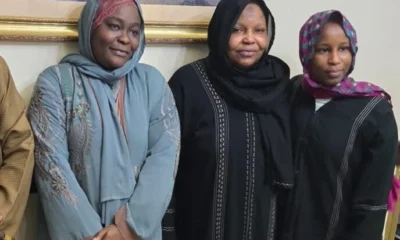
 BIG STORY2 days ago
BIG STORY2 days ago




